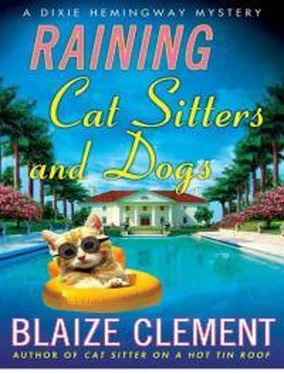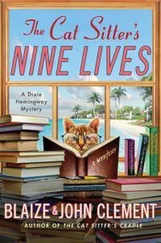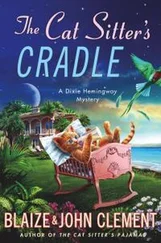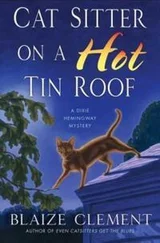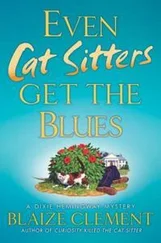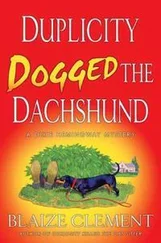That’s one of the best things about having a family. They’ll tell you when you’re doing something dumb. Michael was right. It was senseless to dwell on questions I couldn’t answer.
I said, “You’re right.”
“Damn straight I’m right. And I hope you’ve had your last conversation with Harry Henry and Maureen Rhinegold what’s her name now.”
“It’s Salazar, and I have.”
I thanked him for the pie, smooched the top of Ella’s head, and got back into my slicker. When I yanked the yellow hat down around my ears, Ella looked alarmed.
I said, “I’m going to leave early for afternoon rounds.”
Michael said, “We’ll have meatloaf for dinner. Mashed potatoes. Rain food.”
Too brightly, I said, “Great!”
Carnivore that I am, I love meatloaf, especially the kind Michael makes with tomato gravy. But Paco doesn’t eat much meat, so the fact that Michael was planning meatloaf for supper meant he didn’t expect Paco to be home.
I went upstairs to get my pet-sitting stuff and drove off through the soft rain. At least I didn’t have to wear the dumb hat in the car. The parakeets were still hiding in the trees and the lane was soggy under the shell. When I looked across the Gulf to the horizon, it was hard to tell where the sea ended and the sky began. The entire world was gray and dreary.
I wondered if Guidry had finished questioning Maureen and Harry. I wondered if they had posted bail and gone home. I wondered if Harry would ever forgive Maureen.
I caught myself thinking about them, and murmured, “Worry balls.”
It was none of my business what happened with Maureen and Harry. My part in their drama was over. Furthermore, no way, no how, no time would I ever again allow myself to get involved in somebody else’s problems. No matter how long I’d known them or how close we might once have been, people could just damn well take their problems to a nice therapist or a minister or a priest, because I was through.
That’s what I swore, and I really meant it.
I should have remembered that any time you take a stand on something and say you’ll never, no matter what, do that or go there or be involved in something, next thing you know you’ll be up to your eyebrows in it.
At the Sea Breeze, I wore the hat while Billy Elliot and I ran. Either because he was embarrassed to be seen with me or because of the rain, he was willing to confine his run to only one lap around the parking lot’s oval track. At the cats’ houses, the order of the day was lethargic drowsiness. They’d put themselves into lull-land from looking out at the rain, and none of them wanted to play any vigorous games. I felt the same way, so I promised them we’d play twice as long the next time I came.
I took off the hat before I went into Big Bubba’s house. The slicker was alarming enough, I didn’t want him to think a yellow giant from the jungle was after him. He was so subdued by the relentless rain that he hardly acknowledged my presence.
I said, “Your mom will be home in a few days.”
He said, “Get that man,” but he didn’t have his heart in it.
I left him with fresh fruit and a new millet strand and went out the front door. On the porch, I put the yellow rain hat back on and headed home. I didn’t stop at Hetty’s house. I couldn’t bear to talk about Jaz right then. I didn’t even pull the hat off inside the Bronco. All I could think of was going home and having comfort food with Michael.
At Old Stickney Point Road—so named after the city built a new Stickney Point approximately twenty-five feet from the old one—I hit the brakes to keep from broadsiding a khaki-colored Hummer that shot out in front of me and made a sharp turn onto Midnight Pass Road. The driver didn’t even see me. His wipers weren’t working, and he was bent over the steering wheel trying to locate the controls. The driver was Paulie, the kid who’d left fingerprints on Big Bubba’s seed jar.
I dug under my slicker and winkled my cellphone from my tight jeans pocket to call Guidry. I got his voice mail.
I gave him a description and the tag number of the Hummer, even though I was sure it was a rental. I said, “I’m following him. I’ll call you when I have an address.”
Then I put my cellphone back in my pocket and held the steering wheel with both hands, peering through the insistent rain to keep watch on the young killer who might lead me to Jaz.
30
A pale sun sat low on the horizon and cast a sickly yellow light through the rain. Instead of making it easier to see, the light acted as a lens that blurred visibility. Since I was in familiar territory, I was able to navigate by known landmarks, but the Hummer in front of me slowed to a crawl at every eastbound lane. Each time, Paulie’s head turned to look down the lane before he gunned the motor and sped off to the next intersection. All those lanes look alike and some of them don’t have street signs, so it wasn’t surprising that he had trouble finding the right one.
Paulie finally turned left toward the bay, and I swung in behind him. The street was typical of the key, winding and heavily wooded on both sides, with wide stretches of space between the houses. It was dark and gloomy under the trees, and my tires hit several low places that sent up sprays of dirty water. Paulie switched on his lights, but I drove without mine. I didn’t want to call attention to myself.
The closer we got to the bay, the more often Paulie slowed the Hummer and hesitated at driveways. I supposed he was searching for an address or for something familiar about a house.
He slowed even more when he came to a stretch where heavy rain had caused power and sewer damage. Several large panel trucks were parked along the curb, and a big orange backhoe was maneuvering into position in the middle of the street. Barriers had been erected in the street to mark a spot for digging, and a group of men in black rain slickers and rain hats stood by to watch the operation. Beyond the backhoe, an FPL truck with a raised cherry picker crane and two men inside the bucket stood beside a streetlight.
As if all the activity surprised him, Paulie came to a complete stop in the street and looked at the workers for a moment before he turned into the driveway of a one-story stucco house. The garage door began rising, and a curtain twitched aside at one of the lighted windows. A girl illuminated by inside lamplight peered out at the workmen in the street. She looked frantic, and her mouth opened as if she was trying to get their attention.
It was Jaz.
Somebody jerked her away, and the curtain closed.
While Paulie waited for the garage door to rise high enough to drive under, I came to a lurching stop at the curb behind a Verizon truck.
The garage door reached its tallest height and Paulie drove inside.
A voice somewhere in the dark recesses of my mind spoke in a flat, unemotional voice: You know what you have to do .
The thing about internal voices is that they call you to action right then . No time to think about it, no time for debates, no time to weigh consequences. Normal people would say what I did next was insane, but normal people have never met themselves face-to-face.
As the garage door began a rattling descent, I opened my car door and ran like hell. The garage door was about four feet from the ground when I got to it, and I swooped under it and duck-walked to the rear of the Hummer.
Paulie was hauling Siesta Grill take-out bags from the Hummer and trying to figure out how to carry all of them in one trip. Stacking them and balancing them taxed his brain, but he finally managed to gather them all in both arms. Without a free arm to keep his low-hanging pants from falling, he had to walk spraddle legged to the back door. He kicked the door to get somebody’s attention, and when the door opened he dropped some of the bags.
Читать дальше
